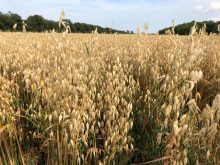Winnipeg (Resource News International) — Husky Energy will soon begin operations at a new
130 million-litre-per-year ethanol plant in Minnedosa, Man.,
and is aggressively in the market for feed wheat
supplies to run the facility. A company official said contracts
for January delivery were just announced this week.
Raymond Dyck, feedstock manager at Husky’s Minnedosa plant,
said the grain silos are currently 75 per cent full, and will continue to
be filled in stages to watch that everything is structurally
sound.
Read Also

Pulse Weekly: Spike in yellow peas slowing
Although the price increases for Canadian yellow peas have started to slow, there could be more of the peas planted come spring, said Kress Schmidt, broker with Johnston Grains in Calgary.
Once operational the facility will need roughly 350,000
tonnes of wheat annually, according to numbers provided by
the company. Husky had a supply agreement with the former
Agricore United to supply 50 per cent of the feed wheat for the plant
over the course of three years. Dyck said the prior agreement
still stands since Agricore was purchased by the Saskatchewan
Wheat Pool and the new combined entity was renamed Viterra.
In addition, Husky is going out with its own grain
contracts, offering $6 per bushel for wheat delivered to the
plant, said Dyck.
The earliest contracts available are for
January delivery, but Dyck said those could be pulled in earlier
if required.
With the Canadian Wheat Board (CWB) also offering strong
program would be attractive. “We want to tell producers that
we’re in the marketplace and we’re serious,” he said.
Agreements in place require the Minnedosa plant to source at
least 85 per cent of its feedstock from Manitoba. Dyck said there was
some concern about finding enough grain in the province. While
some supplies will need to be brought in from outside the
province, he was confident that the majority would be still be
sourced from the draw area.
The option of bringing in corn is also there, especially as
corn prices are cheaper than wheat, said Dyck. Although, any corn
used at the plant would need to be blended in with the wheat at a
consistent rate in order to insure the dried distillers grains
left over from ethanol production contained a consistent protein
Jake Davidson, a producer in the Minnedosa area and
executive manager of Winter Cereals Canada, said the increased
demand for wheat provided by the Husky plant will definitely be
good news for wheat growers, as once the new plant is operational
it will be bringing in 20 times as much wheat on a daily
basis than Husky’s former facility.
“The feed industry will see
that wheat is a little more expensive than they are used to,” he
said.















